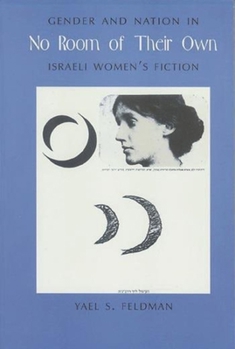No Room of Their Own: Gender and Nation in Israeli Women's Fiction
(Part of the Gender and Culture Series Series)
Unlike the literary traditions of the United States, England, and France, the first century of Hebrew literature was lacking in women novelists; women tended to write poetry, while prose fiction was mainly the domain of male writers. Since the 1980s, however, there has been a virtual explosion of commercially successful Hebrew fiction by women that includes many traditionally male genres, such as the historical novel, fictional autobiography, and...
Format:Paperback
Language:English
ISBN:0231111479
ISBN13:9780231111478
Release Date:December 1999
Publisher:Columbia University Press
Length:248 Pages
Weight:1.10 lbs.
Dimensions:0.8" x 6.0" x 9.0"
Customer Reviews
1 rating
An eye opening analysis of Israeli female authored fiction
Published by Thriftbooks.com User , 24 years ago
An Associate Professor of Hebrew and Judaic Studies at NYU, Feldman has written an eye-opening comparative analysis that will cause you to never read a book authored by a woman the same way again. I am not used to reading literary or gender theory, but this provided an excellent introduction, as well as providing a synopsis of the feminist works of Virginia Woolf and Simone Beauvoir. As Feldman's book taught me, you rarely saw Israeli women authors prior to 1980. It was the time of social realism literature, stories of "WE" the nation builders. But in 1997, four of Israel's best seller's were authored by religious women. Prior to the Yom Kippur War, Israeli women, like Leah Goldberg, wrote poetry; and men wrote fiction. For all the lip service that was paid to the new Hebrew socialist culture of the pioneers and the kibbutz, much of it was lip service when it came to gender roles. But since 1980, women have published historical fiction, biography, and mystery (Batya Gur) successfully in Israel. Many have them have projected contemporary concerns over the role of women in Israeli society onto their heroines from the pre-State period. Feldman focuses on five women authors: Amalia Kahana Carmon (Chapter 3), Shulamith Hareven (Chapter 5 and 6.3), Netiva Ben Yehuda (chapter 7), Ruth Almog (Chapter 8), and Shulamit Lapid (Chapter 1). I was captivated by the analysis of Lapid's "GEI ONI", a fictional story about the founding of Rosh Pinna (its original name was a Hebrew takeoff on the name of the Arab village). Was it a best seller in Israel because it dared to write about a fictional pioneering Woman of the first Aliyah? (Why do we only hear about the male pioneers?) Long story, short... Feldman shows the richness and subtleties of Israeli women's fiction as she explores the themes of gender and nation, as well as the (non)representation of the "New Hebrew Woman" in the works of these five authors who are the "foremothers" of the contemporary boom in Israeli Women's fiction.






